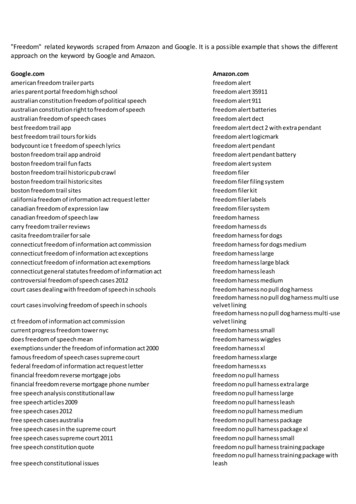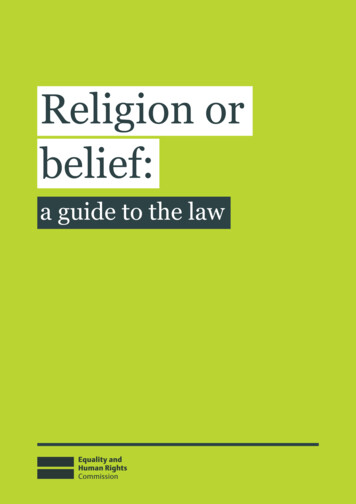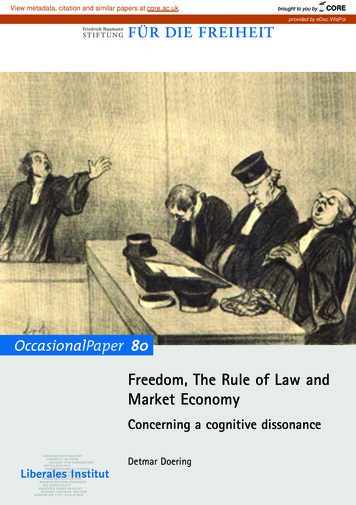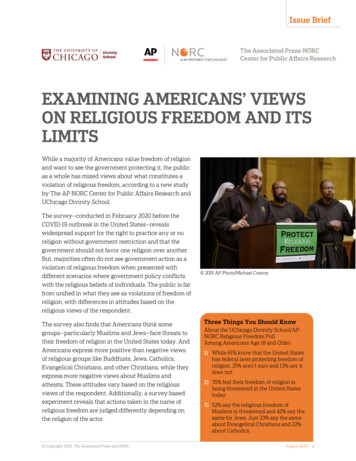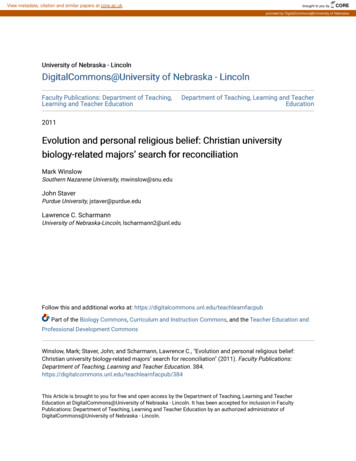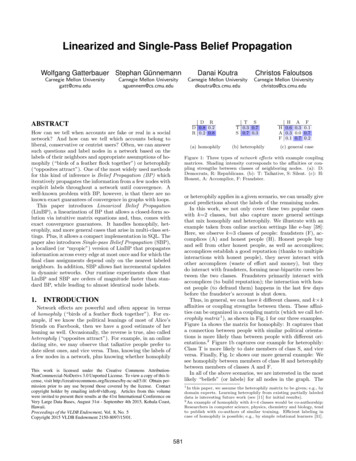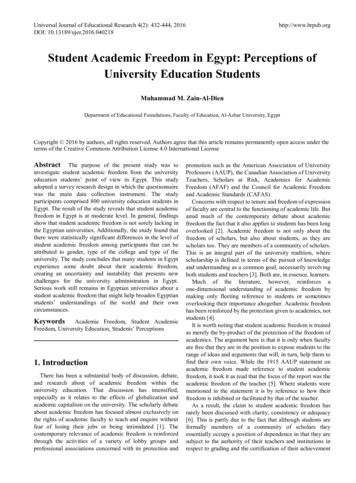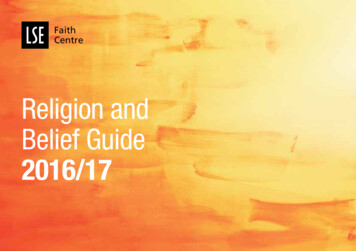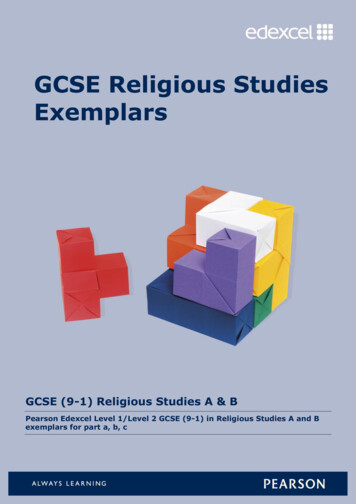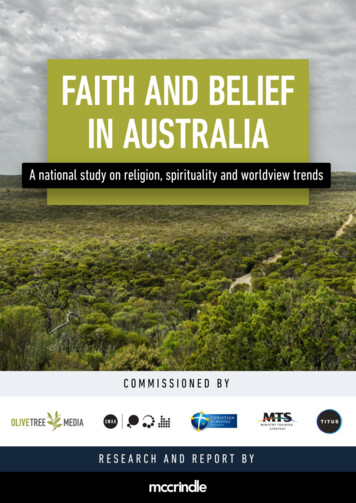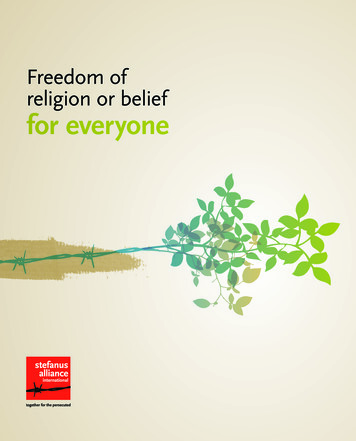
Transcription
Freedom ofreligion or belieffor everyone1
Produced by:Stefanus AllianceInternationalFifth edition 2020First published 2012Contributors:Ed BrownKristin StorakerLisa WintherFreedom of Religion or Belief:Why, What and HowDesign: Tyde 2020 StefanusAlliance InternationalFreedom of thought, conscience, religion orbelief continues to challenge authoritariangovernments, religious hegemonies and collective narrow-mindedness in various parts ofthe world. It is important to understand whereexactly the challenges lie in order to find appropriate responses. This booklet is very helpfulin this regard – clear, precise and easy to read. Ivery much like it, its spirit, messages, structureand pedagogical impetus.”Heiner BielefeldtUN Special Rapporteur on Freedom of Religionor Belief (2010 - 2016)2The FoRB booklet is an important tool for human rights education andadvocacy. Freedom of Religion and Belief is, perhaps, the most challenging of rights to comprehend with clarity. The emphasis on freedomto manifest one’s religion or belief is always counterbalanced. It cannotfully curb the rights of others to disagree with their religious beliefsand have a right not to be subjected to religious intolerance. Discussion on religions and beliefs can be highly emotional and often leads toconflicts This, in no way, should be used as deterrent to free speech orto affixiate debate.Even governments have a delicate role to play. They must remain neutral, but often have to intervene to protect those being discriminatedagainst or persecuted in the name of religion. The FoRB booklet spellsout the red lines for all stakeholders. More importantly, it includes therights of those who may not have a religion or wish to adopt any otherfaith and indeed underlines the basic principle that it is individuals andcommunities that have rights, not religions, faiths or ideologies.”Asma JahangirUN Special Rapporteur on Freedom of Religion or Belief ( 2004 - 2010)All rights reserved.The contents of this publicationmay be used and or reproducedfor educational and other noncommercial purposes, as long asStefanus Alliance International isacknowledged as the source.Contents1. Freedom of religion or belief – in everyone’s interest2. Why is freedom of religion or belief important?3. What is freedom of religion or belief?3.1 Core documents3.2 The seven dimensions3.3 What about limitations?3.4 Common misunderstandings4. Possible tensions between freedom of religion or belief and other rights4.1 FoRB* and freedom of expression - hate speech and blasphemy4.2 FoRB* and women’s rights5. How is freedom of religion or belief abused?5.1 Candelin s three phases of persecution5.2 Illegitimate limitations on freedom of religion or belief5.3 Government restrictions5.4 Social hostilities6. What can we do?7. Digging deeper469910121416161820202122222426Authors’ noteThree years ago, we published the first edition of thisbooklet. During the years it has been effectively used in anumber of countries and been translated into several languages. Now it is time to revise the booklet and includesome additional themes, like possible tensions betweenfreedom of religion or belief and other rights.A new feature is questions for reflection and discussionat the end of each chapter.At the very end of the booklet you willfind a practical fold out leaflet wheredifficult words or concepts, markedwith an asterisk (*) in the text, areexplained. For best use, we recommend that you open the leaflet whilereading in order to have easy accessto the glossary.3
1. Freedom ofreligion or beliefCASEViolence against Muslims in India– in everyone’s interestThe overwhelming majority of the world’s populationholds a religious belief. Unfortunately, people’s possibilityto freely choose and express their belief is being increasingly restricted.14On July 11, 2019, nine Bahaʼis were sentenced to prisonin Iran as part of an intensified government crackdownagainst the Baha’i community.2 In England, a Jewish familywas physically harassed in the street in August 2019. British authorities report that 47% of hate crimes in Englandtargets Muslims and 18% targets Jews, even though theyonly make up 0.5% of the population.3 On September 19,2019, six Jehovah’s Witnesses were sentenced to betweentwo and three and a half years in prison. The Russian Supreme Court banned all activity related to Jehovah’s Witnesses in 2017. 4 Authorities in Algeria forcibly closed eightProtestant churches in the span of two months during thefall of 2019, and violently arrested several protesters.5 Atleast 3000 Yazidis from Northern Iraq are as of 2019 stillheld in captivity by IS following the genocide targetingthem in 2014. Many women have been sold as sex slavesand forcibly converted to Islam.6 Vietnamese Hòa HàoBuddhists were beaten by plainclothes police after protesting a planned demolition of a temple in October 2019.They belong to an unregistered Buddhist community.7In November 2019, the UN criticized China’s systematicassaults on Muslims in the Xinjiang region, where regularreligious practice may be considered terrorism and morethan a million Muslims, especially Uyghurs, are assumedarbitrarily arrested and sent to detention and re-educationcamps.8 A Pakistani university professor was sentenced todeath on December 21, 2019, convicted of blasphemy byinsulting Islam.9The situation for religious minorities in Indiahas deteriorated since the Hindu-Nationalistparty BJP gained power in 2014. Hindu nationalists believe a true Indian citizen is also a Hinduand therefore regularly harass and attack nonHindus.These are just a few examples illustrating thatnot all people can believe what they want,change their beliefs and express their belieffreely, despite the fact that the fundamentalhuman right of freedom of religion or belief isenshrined in various human rights documentsand widely recognized by nearly all governmentsin the world. AWith this booklet, Stefanus Alliance International will explain the why, what and how of freedomof religion of belief: why it is important, whatits central elements are and how it is abusedand how it can be promoted. The goal of thisbooklet is to provide a tool for anyone interestedin learning more about FoRB. We also hopethat it will be used to promote and protect thisfundamental freedom around the world. It is ourbelief that promotion, protection and respect ofFoRB is an important and necessary ingredientin the development of multi-religious societiescharacterized by tolerance and peaceful coexistence.AAs of January 2020 173 of the 193 memberstates of the UN are state parties to the International Covenant on Civil and Political Rights(ICCPR*), a binding treaty, which states inarticle 18 that everyone has the right to freedomof thought, conscience and religion.Cows are considered holy animals withinHinduism. The ruling party BJP has frequentlybeen involved in hate-speech targeting thosewho sell, buy, and eat beef. This has led to hatecrimes and attacks on especially Muslims byHindus aiming at protecting cows, as Muslimsrather eat beef than pork which is forbidden bytheir faith.In April 2019, Shaukat Ali, a Muslim, was attacked by a mob who beat him with sticksand kicked him while forcing him to eat pork.Shaukat’s family ran a small restaurant for manyyears that served food containing beef. Peoplegathered around Shaukat and filmed the attackrather than helping him. He is still unable towalk due to the injuries he sustained during theassault.Between May 2015 and December 2018, at least44 people have been killed in similar attacks,including 36 Muslims. Around 280 people wereinjured in more than 100 assaults during thesame period. Local police have often obstructedthe prosecution of the perpetrators and localBJP politicians have supported the attacks.Source: BBC, May 16, 2019.Human Rights Watch.5
2. Why is FoRBimportant?When President Franklin D. Roosevelt, one of the driving forces behind the establishmentof the UN, envisioned a world of peaceful coexistence between nations, he stressed fourfundamental freedoms: freedom of speech, freedom of belief, freedom from want andfreedom from fear.10 Freedom of thought, conscience and belief, often referred to as theright to freedom of religion of belief (FoRB) is considered by many to be one of the foundations of a democratic society.116Illegitimate* limitations on religious practice and persecution on the grounds of religionor belief affect all religious groups, including atheists* and agnostics*, and it occurs in allparts of the world.12 42%13 of the countries in the world enforce high or very high restrictions on religion. Because some of the most restrictive countries are highly populated,83%14 of the world’s population live in countries with high or very high restrictions onreligion, the brunt of which often falls on religious minorities that are often viewed aseconomic, cultural or political threats to the majority.There are several reasons why FoRB is important.They can be summarized as follows:Religious freedom is important in itself, becauseit gives individuals the right to form personalbelieves, and to manifest and express them.Religion is both a set of religious teachings andpractices, but in many countries and communities around the world it is just as much aboutthe sense of identity and belonging to a group.Violations of FoRB are closely connected withand threaten other civil and political rights,such as the right to life, privacy, assembly andexpression, as well as social, economic andcultural rights. The status of FoRB can oftenbe an indicator of the general human rights situation ina country. When the space for religious expression is restricted, so is freedom of speech. Prisoners of faith oftenfind their right to a fair trial violated. Women, children,migrant workers and refugees are especially vulnerable toFoRB violations. Discrimination based on religion affectsminorities’ access to social and economic goods, and cancontribute to grievances that destabilize a society. Dataindicates that support for the rights of LGBT communities increases in societies with higher levels of freedomof religion or belief.15 Thus, working for religious freedompromotes human rights in general, something which everyone benefits from.16Democratization* and civil society*: Civil society plays animportant role in holding authorities accountable and beinga counterweight to power holders. Low levels of religiousfreedom reduce people’s possibilities to form civil societygroups and become actors for change. Faith based movements provide great opportunities for people to organize ona grass roots level and become important actors for bothdemocratization processes and poverty reduction. Authoritarian* states fear this potential and try to restrict civilsociety and their influence by reducing and limiting religiousfreedom. When governments live up to their responsibilityand ensure religious freedom this can contribute positivelyto a democratization process and a strong civil society.17Socioeconomic* well-being and stability: Research showsa strong correlation between FoRB and the economicdevelopment in a country and the socioeconomic wellbeing of its people,18 in addition to the level of violence. Highrestrictions on FoRB strongly correlate with:– The economy. States with high restrictions on FoRB tendto have lower gross domestic product (GDP)* and lowerscores on the UN’s human development index (HDI)*.– Women’s socioeconomic status. Women who live in stateswith high restrictions on FoRB tend to have lower participation in national parliaments, professional working life,and secondary school. Consequently, these women alsohave a lower estimated income than women who live instates with low/no restrictions on FoRB.7
– Health. The levels of infant mortality and the numberof underweight children are higher in countries withhigh restrictions on FoRB than in countries with low/norestrictions on FoRB.– Violent conflict and high levels of military spending. Inmany countries, religious pluralism and multiculturalismare often viewed as potential threats. Numerous governments try to restrict religious freedoms in an effort tomaintain national harmony, security and order. Statistical analysis, however, shows that it is not the numberof religions in a country that explains the existence ofreligious conflict and persecution, but rather the governmental restrictions and regulations on religion. Whenthe government discriminates on religious grounds andlet violators go unpunished, it legitimizes and justifies violence by other actors in society. This may leadto further governmental regulations in an attempt toregulate social violent tensions, and thus opens the doorfor increased persecution. The end is an ongoing viciouscircle of regulations and persecution. FoRB, on the otherhand, creates conditions that make peaceful co-existencebetween religious groups possible.19The questions for discussionat the end of each chapterare suggestions to help you toreflect on important issues.Questions fordiscussion1 What does FoRB mean to you?In what ways is it important for youand for others? Do you think it meansdifferent things for different people?Why?2 Which FoRB violations have you heardof or read about recently?3 Can you give examples of how FoRBis interconnected with other humanrights? Which ones and how?4 In what ways can and do religiouscommunities play a positive role instrengthening democratic development in society? What conditions doyou think need to be in place in orderfor this to happen?latRegu ionsThe vicious circleof regulationsand persecutioncuPerse tionPersecution5 In what ways do you think FoRBlatiRegu ons8Consequently, FoRB is not only a fundamental individualright, but it is also important for the democratic andeconomic situation of a state, the wellbeing of its citizens,and the stability and peace among its inhabitants. Neglecting this freedom can have far-reaching and seriousconsequences, both nationally and internationally. Therefore, FoRB is of great importance to everyone; those whoconsider themselves religious and those who considerthemselves non-religious alike.3. What is FoRB?contributes to economic developmentand socioeconomic wellbeing?Freedom of religion or belief should be interpreted broadly andprotects individuals who profess and practice different kinds ofreligions, i.e. traditional, non-traditional and new religions, atheismand agnosticism. It also protects the right to have no confession atall.20 As previously mentioned, FoRB gives everyone the right to havea religion or belief; change his/her religion or belief; and practice his/her religion or belief as he/she likes.21As with all other human rights, individuals are the primary holders ofFoRB. The government is the primary duty bearer. At the same time,FoRB has certain collective aspects where the religious communityas a group enjoy certain rights, e.g. the right to obtain legal recognition as a religious community, the right to decide over internal affairs,like choosing suitable leaders, the right to create religious schools andto provide services to the public.223.1 Core documentsArticle 18 in the Universal Declaration of Human Rights (UDHR)Article 18 in the International Covenant on Civil and Political Rights (ICCPR)The 1981 Declaration on the Elimination of All Forms of Intolerance and ofDiscrimination Based on Religion or BeliefGeneral Comment 22, where the Human Rights Committee explains the meaning of article 18 in the ICCPREven if countries have not ratified binding international treatiesprotecting FoRB, this freedom is considered to be protected as apart of customary international law.23 In addition to the international9
documents, there are regional documents on the subject of FoRB. It is important to note that these documents have varying definitions of FoRB and not allprovide equally good protection of FoRB as the ICCPR does.Article 9 in the Council of Europe’s Convention for the protection ofHuman Rights and Fundamental Freedoms (ECHR)Paragraph 16 in the Organization for Security and Cooperation inEurope’s Concluding document in Vienna 1986Article 8 of the African Union’s Charter on Human andPeoples’ RightsArticle 26 and 27 in the Arab Charter on Human RightsArticle 12 in the American Convention on Human Rights3.2 Six dimensions of FoRBWhat does freedom of religion then mean in practice? The state has the responsibility torespect, protect and promote the following six dimensions of FoRB:241 The freedom to have, choose and change a religion or belief10As mentioned before, FoRB gives everyone the right to freely have, choose and changea religion or belief. This is sometimes called the inner freedom, and can never be legitimately limited by anyone or by any means whatsoever. It is, according to human rightsdocuments, absolutely protected without exceptions or conditions.25 Still, the right tochange one’s religion is debated and challenged. Religious identity is often viewed asconnected with ethnic or national identities. However, this becomes problematic whenpeople are restricted from changing their religion or belief to a faith that is not traditionally associated with one’s ethnic group or nationality. Numerous governments andgroups ban people from belonging to, changing or leaving a particular religion. In manycountries, people who choose to leave a religion face threats and violence from society.Requirements to reveal one’s religion, such as on ID-cards or other required governmentforms, are often used to discriminate and persecute.2 The freedom to practice a religion or beliefThe outer freedom includes the right to manifest, practice andexpress one’s belief in private or public, alone or in community withothers.26 It contains, among other things, the right to:Worship or assemble in connection with a religion or belief, and toestablish and maintain houses of worship.Establish and maintain charitable and humanitarian institutions.Make, acquire and use necessary articles and materials related to therites or customs of a religion or belief.Write, issue, publish and distribute religious literature.Teach a religion or belief in suitable places.Ask for and receive voluntary financial donations or other gifts fromindividuals and institutions.Train, appoint and elect suitable leaders and teachers according tothe requirements and standards of any religion or belief.Establish and maintain communications with individuals and communities in matters of religion or belief at national and internationallevel.Observe days of rest; celebrate holidays and ceremonies in accordance with one’s religion or belief; dress and eat in accordance withthe prescription of one’s religion; use religious symbols; and to shareone’s faith with others in non-coercive* missionary activities.As a part of the right to practice, religious belief groupshave the right to be officially recoginized as communities, and those who seek for it should be given legal entitystatus in order to have a formal body representing theirinterests and rights as communities. Nevertheless, official registration or legal entity status should never be arequirement for religious or belief groups to exercise FoRBor their right to decide over own affairs. Even though theprimary right holders are individuals, existing standardshighlight the importance of the collective dimension ofFoRB, held in common by the many members of religious communities.27 Unfortunately, strict laws regardingregistration are used in many places in the world to discriminate, harass and persecute communities of religiousbelievers.3 Freedom from coercion*Nobody has the right to force another person to have,maintain or change a belief. Force can mean to persuadesomeone to change a religion against their will by usingphysical violence or threats thereof, psychological violence, criminal penalties or more subtle forms of illegalinfluence. UN General Comment 22 on how to interpretArticle 18 in ICCPR states that if a government uses material benefits or restricts access to medical care, educationand/or employment in order to influence people’s choiceof religion; this is to be considered as an indirect form ofcoercion.2811
4 Freedom from discriminationEveryone is entitled to FoRB without discrimination. States are obliged to respect, protect andpromote this freedom to all persons within theircountry. Majority religions should have no advantage over minority religions. It is forbiddento discriminate in any way because of a person’sbeliefs or the religious community to which aperson belongs. The government is obliged totake effective steps in order to prevent this kindof discrimination, whether it occurs in legislation*, in implementation* or in society.29 Thestate should be impartial* and not favor anyreligion. Unfortunately, discrimination basedon religion or belief negatively affects minorities’ access to basic services like education andhealth care all over the world.6 The right to conscientiousobjection*FoRB also protects people from beingforced to act against their conscienceand the core of their beliefs, especiallyregarding the use of weapons or deadly force. Therefore, those who genuinely hold beliefs that forbid militaryservice should be given an alternativenational service. In many countries,this is not possible and refusing military service on religious grounds canbe punishable.315 Rights of parents and guardians and therights of the child12Parents or guardians have the right to raise theirchild in accordance with their own religion orlife stance. This should be done in accordanceto the developing capacities of the child. As thechild matures, he/she must be allowed to makemore decisions regarding his/her own beliefs.30The government may not decide what religionparents should pass on to their children. Thepractice of a religion or belief may never harmthe physical or mental health or development ofthe child. Every child has the right to access toreligious education according to the will of theirparents or guardians and should never be forcedto participate in such education against thesewishes. If religious education in public schoolsis not impartial nor objective, the governmentshould make it possible for students to opt outor to attend alternative classes. Exemptionsfrom these lessons must ble implemented in anon-discriminatory and non-stigmatizing manner. Internationally, millions of minority childrenare forced to participate in biased education infavor of the majority religion or belief.3.3 What aboutlimitations?Some rights are absolute rights,which means that they may neverbe limited or suspended under anycircumstances. The right to freedomfrom torture is one example. Otherrights are qualified rights, whichmeans that they may be limited undercertain well-defined and narrowcircumstances, defined by limitationclauses.32FoRB has both an absolute part(the inner freedom, i.e. the right tohave, choose and change religion orbelief) and a qualified part (the outerfreedom, i.e. the right to practice areligion or belief).33CASEProtestant Christians expelled from theirvillage in MexicoOn July 28, 2019, community leaders broke intothe homes of two protestant couples in a villagein Hidalgo. The leaders destroyed their homesand forced the couples to leave the village.The forced displacement followed monthsof threats and harassment against the families. The couples had for an extended periodrefused to participate in and contribute financially to local Roman Catholic events in thevillage. Community leaders cut their electricity running water and sewage services and hadthem arrested to pressure them to give in. Leaders had tried to force them to sign an agreementbanning Protestants from entering the village.Despite reporting the threats, the state government did not make any attempt to resolve thesituation but rather blamed the Protestants.Protestantism and Roman Catholicism are twodifferent branches of Christianity. The majorityof Mexicans are Roman Catholic, but indigenousgroups include elements of traditional beliefs intheir practice. Because of the large indigenouspopulation, Mexican legislation gives localcommunities the right to protect their cultureand maintain traditional governing structures aslong as rights protected by the Mexican constitution still are respected. However, this freedomis often abused by community leaders resultingin violations of the rights of religious minorities,often without the state authorities holding leaders accountable.Source: Christian Solidarity Worldwide13
Any limitation of FoRB can only apply to the outer freedom, i.e. the right to manifest, practice and express areligion or belief. The limitation should never be appliedin a discriminatory way. Any restriction or limitation mustmeet all of the following three requirements:34Grounded in national law.Necessary in order to protect one of the following public goods:– Public security– Public order– Public health– Public morals (the claim of what is public morals must be based inmore than one religious tradition)– Basic human rights and freedoms of othersIf the state can obtain the goal sought by the limitation in anotherway, it must choose the solution that does not limit FoRB.Proportionate and non-discriminatory. Proportionate means that ifthe state really has to limit FoRB in order to obtain one of the abovementioned goals, the extent of the limitation needs to be in balancewith the actual danger that the religious practice constitutes. In addition, the limitation must be applied equally to followers of differentreligions or beliefs.3.4 Common misunderstandings14Freedom of religion or belief challenges and is challenged both nationally andinternationally. There are several common misunderstandings about whatFoRB is and is not. It is therefore useful to look at some of these misunderstandings.35 Contrary to what many may think, FoRB is not:About enforcing interreligious harmony nor preserving the existingreligious patterns in society. FoRB allows people to freely chooseand change their religion or belief, even if it would change thereligious map of a country and be perceived as threatening by theauthorities. Just like protecting the rights of followers of mainstreaminterpretation of religions or beliefs, FoRB also protects minorities,minorities within minorities, converts and re-converts, reformersand dissidents. FoRB makes religious pluralism and diversity possible and enables different religious groups and interpretations toco-exist peacefully. Therefore, the former UN Special Rapporteur onFreedom of Religion or Belief, Heiner BielefeldtB, calls FoRB a nonharmonious peace project.BBetween 2010 to 2016.An exclusively Western/Christian concept. Onecan find elements of FoRB in many differentreligious and philosophical traditions. Leadersfrom many of the world’s major religions haveadvocated for religious tolerance and elementsof FoRB long before it was enshrined in modernhuman rights documents.36The removal of religion from the public spherenor an enforced privatization of religion. FoRBassumes that the state is impartial with regardto all worldviews and life stands, both religiousand non-religious, and does not privilege anyparticular religion or belief. However, this doesnot justify suppressing all visible manifestationsof religious practices or symbols in order to create a religion-free public sphere.Protection of religions themselves, nor theirgods, prophets or sacred texts, from ridiculeand criticism. As with other human rights, FoRBprotects human beings, i.e. the person holdingreligious beliefs or worldviews. It does not protect ideas or doctrines. Nevertheless, one cannot use religion to propagate religious hatredthat leads to incitement* of violence or discrimination.37 This point will be further examined inthe following chapter.Questions fordiscussion1 When reading chapter 3, did your understandingof FoRB change? If yes, in what way?2 Do you know someone who has converted fromone religion or belief to another? How does yourcommunity react when somebody converts toanother religion or belief? Is it different fromhow you react if somebody embraces yourfaith? Why? What do international human rightsnorms say about conversion?3 When expressing and practicing your religion orbelief, what is important for you? Do you think itis ok for followers of other religions or beliefs toexpress and practice their faith in the same way?Is there a difference? Why?4 What obstacles does your own religious/beliefcommunity face regarding the outer freedom?5 Which legitimate restrictions on FoRB occurpresently in your context?6 Which restrictions on FoRB in your society donot fulfil all the three requirements makingrestrictions legitimate? Which dimensions suffermost from these illegitimate restrictions?7 Which restrictions on FoRB do you think arelacking in your society? Would these be legitimate or illegitimate according to internationalstandards?15
4 Possible tensionsbetween FoRB andother rightsThe basic principles underlying human rights state that these rights are:Universal. They are the same for everyone everywhere.Indivisible. They cannot be separated from each other.Interdependent and interrelated. They are connected toeach other and the fulfilment of one right is dependent onthe fulfilment of other rights.16This integrated perspective is important to uphold even in complicated and tense situations where there are practical conflicts in theimplementation of rights.38 When tensions between rights arise,it is necessary to keep in mind how human rights are connectedand dependent on each other. A tension does not necessarily implythat one right has to trump the other in a zero-sum game*, but oneshould try reconcile, to the maximum degree as possible, all humanrights issues at stake.4.1 FoRB and Freedom of Expression– hate speech and blasphemyIn addition to FoRB, freedom of expressio
Illegitimate* limitations on religious practice and persecution on the grounds of religion or belief affect all religious groups, including atheists* and agnostics*, and it occurs in all parts of the world.12 42%13 of the countries in the world enforce high or very high restric-tions on religion.
